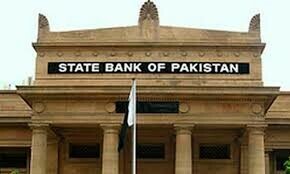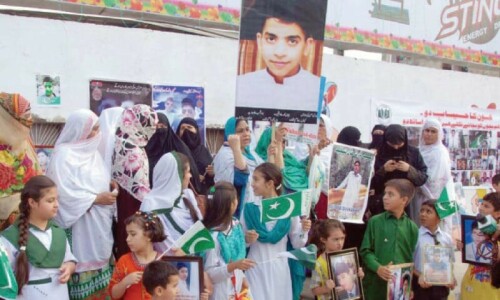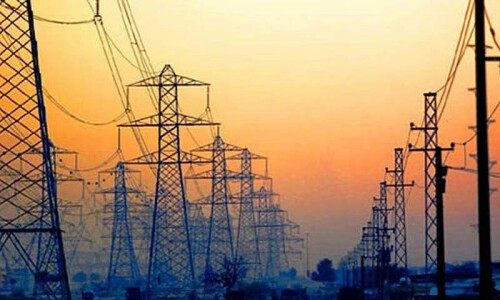The notion of the Federally Administered Tribal Areas (Fata) as the epicentre of international terrorism has rapidly gained traction — not only are Pakistan and Afghanistan being affected by the militancy infested in the area, the threat has become credible enough for the international community to sit up and take note. A new debate is raging: what should Fata’s fate be?
Fata is currently governed as a special tribal region under separate constitutional arrangements. The region, comprising a total area of 27,220 square kilometres, is inhabited by almost a dozen Pakhtun tribes. It is constituted by seven tribal agencies — Bajaur, Mohmand, Khyber, Kurram, Orakzai, North Waziristan and South Waziristan — and six frontier regions (FRs): FR Peshawar, FR Kohat, FR Bannu, FR Lakki Marwat, FR Tank and FR Dera Ismail Khan.
Almost all of the seven tribal agencies that constitute Fata as well as the adjacent frontier regions have been overrun by militancy and the military operations carried out in response.
Four schools of thought exist about the future of the Federally Administered Tribal Areas. What are their merits and demerits?
The discussion on the fate of Fata restarted after Federal Minister for States and Frontier Region (SAFRON) Lt Gen (retd) Abdul Qadir Baloch claimed that the government is planning to give Fata the status of a province. “The government is working to hand a Gilgit-Baltistan-like administrative status for tribal areas,” said the minister on April 22 while speaking at a conference. Baloch had earlier aired the same suggestion in February, during a meeting of the National Assembly’s standing committee on Safron.
The minister’s stance gives weight to the idea that the Pakistan government remains under immense pressure to act decisively to bring the region into the mainstream, and to make special provisions to end underdevelopment, backwardness and violent realities of the tribes’ people. Western diplomatic circles also confirm that they too have been pushing the Pakistani government to alter Fata’s current administrative set-up — a move that they see as key to curbing militancy in the wider region.
“Tribal people need a new social contract and a new economic and power structure because Taliban militancy and the continuous military operation in the tribal region have caused irremediable damage to the old administrative and legal governing system,” says a Western diplomat, requesting anonymity.
The idea that Fata and KP should be amalgamated finds representation in Pakhtun nationalism. Tribal elders who support this merger, explains Dawar, are “Pakhtun nationalists” who believe in the unification of the Pakhtun regions in Pakistan... On the other hand, tribal politicians remain adamant that the best way forward is to carve a separate province altogether.
However, also in play are a great number of indigenous voices and a range of ideas on how Fata should be governed. Ihsan Dawar, a political analyst from North Waziristan, explains that local stakeholders are broadly divided into four schools of thought: one believes that Fata territory should be merged with KP proper, the second argues for Fata becoming a separate province, a third group says it should turn into a Fata council and the last argues that status quo should be maintained.
The four schools and their proponents
Political parties, Fata-based civil society organisations, and tribal elders are all demanding a change in the current administrative set-up of Fata, but they remain poles apart on the specifics because each is firmly camped in a different school of thought.
The idea that Fata and KP should be amalgamated finds representation in Pakhtun nationalism. Tribal elders who support this merger, explains Dawar, are “Pakhtun nationalists” who believe in the unification of the Pakhtun regions in Pakistan.
Underpinning the amalgamation argument is the idea that Fata and KP are a natural geographical unit, explains Akbar Watanyaar, a Pashto poet from Khyber Agency. “As one big province, our people will have great influence in national and international affairs. People across the world are struggling for unification of their divided land but some ‘forces’ deliberately impose the colonial principle of ‘divide and rule’ on Pakhtuns,” he says.
In practical terms, tribal people are already dependent for health, education, commerce and other concerns on the nearest metropolitan centres of KP. A large number of people from every agency and tribe have settled in adjacent cities. Dera Ismail Khan and Tank are home to people of many tribes from South Waziristan, while Bannu is the second abode of many from North Waziristan. Similarly, a large number of Mohmands made their way to Charsadda and Peshawar to earn their livelihoods and are permanently settled there.
In the same way, the administration of the tribal region is still dealt with by the Fata Secretariat in Peshawar. Historically, the affairs of Khyber, Orakzai and South Waziristan agencies have been and continue to be controlled and run from their headquarters, located in Peshawar, Hangu and Tank respectively.
The first proposal has both the Awami National Party (ANP) and the Qaumi Watan Party (QWP) putting their weight behind it. Bushra Gohar, a central leader of the ANP, said that the party’s constitution recognises Fata as an integral part of KP, and during the passage of the 18th Constitutional Amendment, the ANP proposed the repeal of Articles 246 & 247 to fully integrate the tribal areas. Gohar, however, maintained that the ANP believes any change to the status of tribal areas should be in accordance with the will and aspirations of the people living there.
On the other hand, tribal politicians remain adamant that the best way forward is to carve a separate province altogether. “Fata should be given the status of a separate province; this means we can have administrative and financial autonomy over our affairs, and our people will progress independently and separately,” argues Habib Malik Orakzai, chief of the Muttahida Qabail Party. “With KP itself unable to resolve its issues in the past 67 years, any amalgamation will increase the problems of the tribal people.”
Those who believe in this second school of thought also include influential politicians, who win elections from Fata as independent candidates or in non-political capacities, sometimes on the basis of tribal strength and at other times, by spending millions of rupees in electioneering.
The third school of thought revolves around constituting a Fata council that is modelled after the Gilgit-Baltistan-council. The argument is that an elected body of people from Fata should be able to decide its future rather than have it decided for them. “Council members should be elected through transparent elections, and they could make laws to bring Fata into mainstream Pakistan,” says Akhundzada Chattan, a former parliamentarian from the PPP who was elected from Bajaur Agency.
Chattan claims that all political leaders and tribal elders of Fata, who were part of various committees — especially headed by Justice (retired) Mian Mohammad Ajmal and Farooq H. Naek, All Fata Siasi Ittehad, Political Parties Joint Committee on Fata Reforms, and a committee formed by Shaheed Bhutto Foundation — unanimously agreed that a Gilgit-Baltistan-like Fata council should be elected in the first phase to decide the tribal areas’ fate.
And lastly, there is the school of thought that is resistant to any kind of overhaul. This position is argued by beneficiaries of the old order: the maliks (tribal chieftains), the political agents, officials of the Fata Secretariat, as well as independent, wealthy political figures. A segment of tribal elders and civil society activists also side by this position, explains a Mohmand Agency-based journalist.
The argument given by this school of thought revolves around reform. Farooq Mehsud, coordinator of the Save Waziristan Rights Society — a civil society group formed by Mehsud, Wazir, Dotani and Suleman Khel tribal elders — alleges that some international organisations are “funding the campaign” for a new Fata province, damaging the culture and traditions of tribal people in the process. Mehsud clarifies that his group wants to amend controversial articles of the existing law while keeping the existing state of affairs intact.
Welcome politics
For the first time in the country’s history, political parties managed to field candidates from Fata in the general elections held in May 2013. This was made possible by an amendment to the Frontier Crimes Regulation (FCR) in August 2011; the new rules extended the Political Parties Act (PPA) 2002 to Fata and allowed political parties to operate there as they do elsewhere in Pakistan.
Prior to this regulation, all 12 members of the National Assembly from Fata and the eight members in Senate were elected independently and could not join any political party. In fact, until the introduction of adult franchise in 1996, elections in tribal areas were based on selective voting — some 35,000 maliks were entitled to cast votes, while the majority would sell votes to the highest bidder.
Not this time: political parties carried out campaigns and canvassed for votes, tribal candidates were allotted symbols of their respective political parties for the first time and a large number cast their votes in Fata’s first party-based elections.
“Although political parties were able to win only four seats, their participation in last May’s general elections has left a positive impact,” argues Chattan. Mehsud believes that the participation of political parties not only gave space to new and young leaders in Fata’s politics but has also politicised the tribal society.
Can a non-Pakhtun govern Fata?
The recent appointment of Sardar Mehtab Ahmed Abbasi, a central leader of the PML-N hailing from the Hazara division, to the position of provincial governor has unleashed a new can of worms.
The law, as it stands, makes the KP governor responsible for looking after the affairs of the Fata region. Traditionally, a KP governor would hold great sway in the tribal areas through connections with tribal elders.
In February, 2012, former president Asif Ali Zardari appointed Shaukatullah Khan, a tribal leader from Bajaur Agency, as the provincial governor. Tribal elders and politicians welcomed the appointment and hoped that the first civilian tribal governor of KP would help ameliorate their problems. Those who criticise Abbasi’s appointment point to the fact that the incumbent governor is unable to speak Pashto.
“Appointing a non-Pashto-speaking governor indicates the approach of the federal government,” remarks Mehsud, claiming that only a governor who belongs to the tribal region can effectively run Fata’s affairs.
Orakzai and Chattan think differently: they believe that Abbasi, who served as provincial chief minister in the 1990s, enjoys full support of the ruling PML-N and can therefore take some strong decisions. “Fata’s affairs are, in fact, run by the army, we saw that previous governors had no power,” claims Chattan. He hopes that being a political figure and with support at the centre, Abbasi can implement new policies to bring Fata into the mainstream.
The writer is a journalist and researcher. He tweets @zalmayzia
Published in Dawn, Sunday Magazine, July 6th, 2014















































